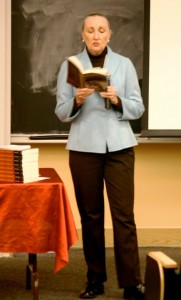
Inspired by a response to The Urban Resident‘s series on Christian Personal Statement and building upon my conversation with Mary Poplin regarding Is Reality Secular? Testing the Assumptions of Four Global Worldviews? (InterVarsity Press, 2014), I asked Mary to share a personal statement that describes her calling/vocation as a Christian professor in a secular university. May you find these words an encouragement as you seek the Lord’s insight in articulating, bearing the marks of, embodying the call to be a “little Christ” (i.e., an image-bearer of God) with academics as mission (i.e., a dialogical mission).[1] Thank-you Mary. To God be the glory! ~ Thomas B. Grosh IV, Associate Director, Emerging Scholars Network.
That your hearts may be encouraged, being knit together in love, to reach all the riches of full assurance of understanding and the knowledge of God’s mystery, which is Christ, in whom are hidden all the treasures of wisdom and knowledge. I say this in order that no one may delude you with plausible arguments. — Colossians 2:2-4
Have no fear of them, nor be troubled, but in your hearts honor Christ the Lord as holy, always being prepared to make a defense to anyone who asks you for a reason for the hope that is in you; yet do it with gentleness and respect, having a good conscience. — 1 Peter 2: 14-16
As a late convert to Christ, it has taken me a long time to get to where I could write a personal statement that describes my call (mind and heart) as a Christian professor in a secular university. Christ has given us His mind so that we may stay alert in our fields to the “plausible [but false] arguments” in the various theories and literature, which we read and assign. There is always some truth in secular theories, but there are also errors of commission and errors of omission. It is my job to introduce students to the widest range of literature on a subject (not just the ones currently in vogue) and help them understand and discern the various principles encoded therein. I also must be prepared to ask questions that will reveal the “plausible [but false] arguments” and suggest there are other ways to look at things.
For example, as an educator I point out that early constructivists (structualists), like Piaget and Levi-Strauss, believed that the knowledge structures and processes they were studying were universal. Mathematical concepts were universal, and even languages though they differed in outward appearance they encoded similar concepts, for example, familial bonds. These deep structures were not particularistic to individuals, eras, or cultures. Later constructivists (post-structuralists) abandoned this assumption. Contrasting this turn, I point out that scientific truths, like laws of gravity or those that govern plant and animal flourishing, are not seen as subject to human construction and reconstruction. Then we have a lively discussion because this assumption of relativism colors everything in today’s social sciences and humanities. This issue of discerning “plausible arguments” is paramount; there is a great need for Christian faculty in every field and across fields to have opportunities to discern our fields’ assumptions together from a Biblical point of view.
Secondly, every Christian professor is always “on call” like our friends in the medical world. The most unlikely students drop in (or email or text) at the most unlikely and sometimes inconvenient times. So we have to be prepared for the atheist whose father just died, the agnostic who wonders about the demonic, the Christian or non-Christian who is afraid, confused, sad or depressed. Then I am just there to listen and ask if I can pray. Maybe that will be last time I see them and maybe not, I just have to have the hoe, the seed and the water at hand. I am called to respond with HIS love and patience for I am always running a little too low on my own.
Footnotes
- The Emerging Scholars Network is making it a mid-fall initiative (possibly paired with some of the material in Scholar’s Compass) to offer additional material on writing a Christian Personal Statement and discussing it’s relationship to various application processes in higher education. Related resources (in addition to what is linked to above): Don’t Fear the Résumé by Rachel Leventhal-Weiner* (Vitae/Chronicle of Higher Ed, 8/25/2014) and Kelly Seaton’s Finding a Postdoc ESN Blog series. As you have insights/stories to share — including a personal and/or group post proposal — and contributor/resource recommendations, please drop us a line. Thank-you! This sharing is what enables us to explore particular topics with more depth. ↩
Tom enjoys daily conversations regarding living out the Biblical Story with his wife Theresa and their four girls, around the block, at Elizabethtown Brethren in Christ Church (where he teaches adult electives and co-leads a small group), among healthcare professionals as the Northeast Regional Director for the Christian Medical & Dental Associations (CMDA), and in higher ed as a volunteer with the Emerging Scholars Network (ESN). For a number of years, the Christian Medical Society / CMDA at Penn State College of Medicine was the hub of his ministry with CMDA. Note: Tom served with InterVarsity Christian Fellowship / USA for 20+ years, including 6+ years as the Associate Director of ESN. He has written for the ESN blog from its launch in August 2008. He has studied Biology (B.S.), Higher Education (M.A.), Spiritual Direction (Certificate), Spiritual Formation (M.A.R.), Ministry to Emerging Generations (D.Min.). To God be the glory!

Leave a Reply